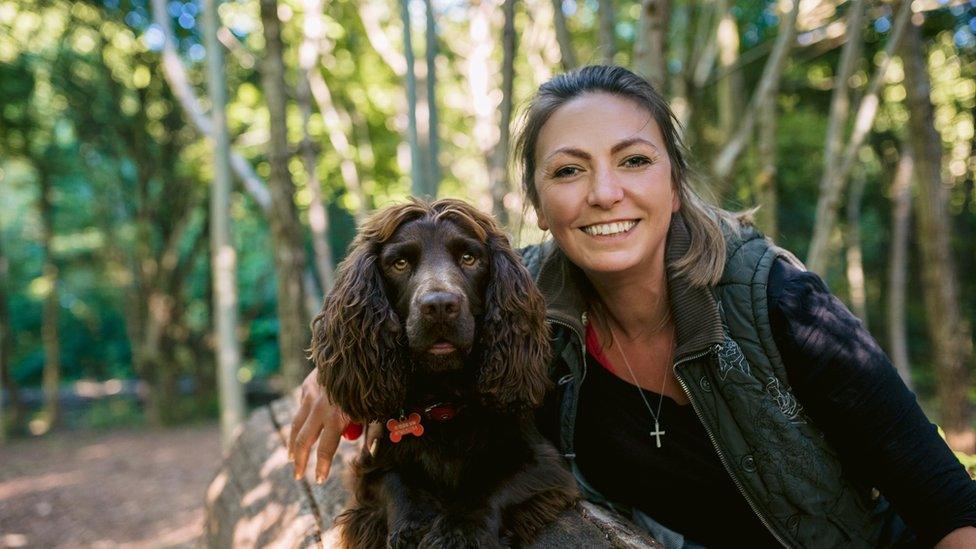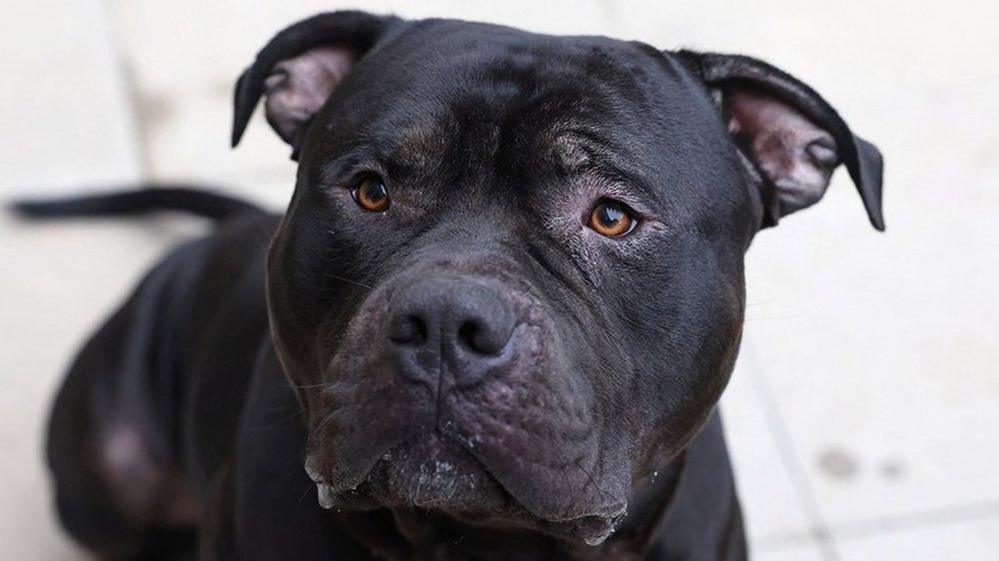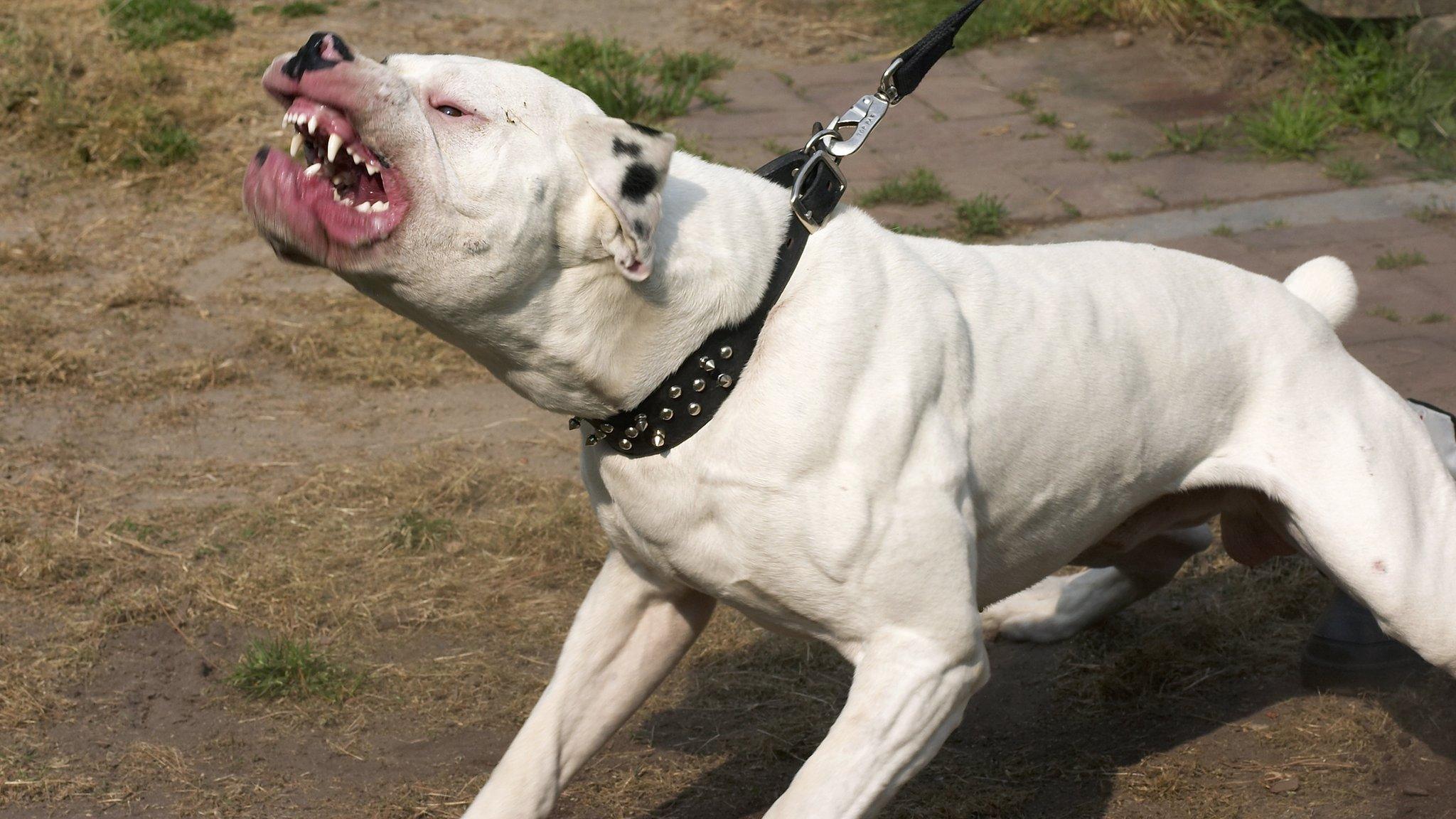Police record 21% rise in dog attacks in England and Wales
- Published

Pauline Elford said her grandson Frankie Macritchie was the "happiest, cheekiest, funniest little boy"
Dog attacks recorded by police in England and Wales have risen by 21% in a year, a BBC investigation shows.
The grandmother of a killed boy said owners of dogs should face manslaughter charges after fatal attacks.
Freedom of Information requests showed police forces recorded 30,539 offences of a dog injuring a person or guide dog in 2023 - up from 25,291 in 2022.
A Defra spokesperson said it encouraged responsible ownership to address control issues before they escalated.
Pauline Elford's nine-year-old grandson Frankie Macritchie died in 2019 after being left alone with an American bull terrier cross.
'Horrendous injuries'
Mrs Elford said Frankie had been left alone with the seven-stone (44kg) dog in a caravan in Cornwall. The dog attacked him, resulting in dozens of bite wounds.
She said nobody heard Frankie's screams and he had died while waiting for someone to come to his rescue.
"When I entered the caravan, I didn't even recognise my own grandson," she said. "The horrendous injuries, entering that caravan must have been like entering hell."
Mrs Elford, who was related to Frankie through his father, said she had knelt beside paramedics as they tried in vain to save him.
Frankie's mother Tawnee Willis was sentenced to two years in prison for cruelty to a person under 16 years.
Her friend Sadie Totterdell was sentenced to three years for owning a dog which caused injury while dangerously out-of-control.
Now Mrs Elford, 57, from Plymouth, is calling for tougher penalties.
She said: "Until sentences are increased, dog attacks will continue, regardless of the breed. The government has to increase sentencing. If your dog kills somebody, it should be a manslaughter charge."

Pauline said Frankie loved everybody he met and always had a smile for everyone
Under the Dangerous Dogs Act, external, people can be put in prison for up to 14 years, be disqualified from ownership or their dangerous dogs can be euthanised. The maximum sentence for manslaughter is life imprisonment.
Since 1 February 2024, it has been a criminal offence to own an unregistered XL bully dog. Environment Secretary Steve Barclay described the ban as an "important measure to protect public safety".
James McNally, solicitor and partner at Slee Blackwell, said "police haven't really taken dog attacks seriously" over the last decade.
He said attacks were often dismissed as a civil matter or police tried to deal with them using restorative justice.
"I think the police have kind of woken up to the problem," he added.

Incident Room: XL Bully Ban, what next?
BBC reporter Jordan Davies asks experts why the ban on the American XL bully dog is controversial and what impact it is likely to have.

Increased reporting
A National Police Chiefs' Council (NPCC) spokesperson said there were officers in all regions focusing on dangerous dogs and dog attacks, with investigations where it was "appropriate and proportionate".
They said the NPCC's Dangerous Dogs Working Group had worked to tackle dog attacks, resulting in an increase in the number of people reporting incidents.
"We believe some of this could be attributed to dogs purchased during lockdown who missed out on key socialisation and have then become too difficult to handle in maturity," they added.
The BBC sent Freedom of Information requests to every local police force in England and Wales.
The responses showed police forces recorded 30,539 offences of an out-of-control dog causing injury to a person or guide dog in 2023 - a 21% increase from the 25,291 recorded in 2022.
The People's Dispensary for Sick Animals estimates there were 11 million dogs, external in the UK in 2023, up 8% on the previous year.
Your device may not support this visualisation
Devon and Cornwall Police recorded the largest percentage rise in attacks, up 51% from 662 in 2022 to 1,002 in 2023.
A force spokesperson said: "There are a number of factors which may contribute to this including an increase in incidents being reported and how offences are recorded based on the information provided.
"Dog owners have a responsibility to keep their dogs under control and this includes providing suitable socialisation, training and safety measures if needed to help reduce the potential of incidents occurring, to keep themselves, the public and other animals safe."
'I needed counselling'
In 2020, Romily - not her real name - was walking her son's dog when a German Shepherd started chasing it and circling her husband.
"We were shouting and screaming," she said. "I was very frightened for the welfare of my husband, so I reached in and pulled the German shepherd off my husband."
She said the dog went back up the road, but returned and mauled her. Her son's dog was on its lead throughout.
"I can now no longer go out and enjoy a walk without extreme apprehension," she said.
"Sometimes it triggers a trauma response, and I will have a panic attack. I needed counselling for the trauma."

Romily said she developed deep vein thrombosis and other medical complications, but the psychological damage has been more profound.
Dr Samantha Gaines from the RSPCA said since the pandemic, some dogs were more likely to have behaviour problems that could increase aggression.
"When we look at aggressive behaviour, the actual key causal factors are around how they've been bred, how they've been reared and how they're managed," she said.
A Royal Veterinary College study found high rates of problem behaviours in dogs bought in the pandemic.
But Dr Gaines warned it was "difficult to highlight any one particular driving force" without a comprehensive system looking at behaviour and other factors involved in serious bite incidents.
Dog behaviour expert Hannah Molloy agreed the pandemic was a factor and told the BBC some new owners had struggled to train their dogs.
She said not all owners understood dog body language, adding: "Our dogs are struggling to communicate with us, and some of those whispers that they might use by licking their lips or turning their head away have turned into shouts."

Dog welfare expert Hannah Molloy, pictured with her spaniel Falkor, said she sees many dogs "who have absolutely no idea about how to socialise with other dogs"
Ms Molloy said the government should set up a licensing agency, with all dogs being microchipped and the fee for licences used to fund enforcement.
A Defra spokesperson said it continued to work with police, local authorities and animal welfare groups to encourage responsible dog ownership and ensure dog control issues were addressed.
"Dog attacks can have tragic consequences, which is why it is a criminal offence to allow any dog to be dangerously out of control," they said.
"Our advice is clear that when looking for pets, buyers should ensure that the dog they buy is suitable for their home and be satisfied that they will be able to train and control it effectively."
Related topics
- Published24 March

- Published18 February 2024

- Published22 January 2024
